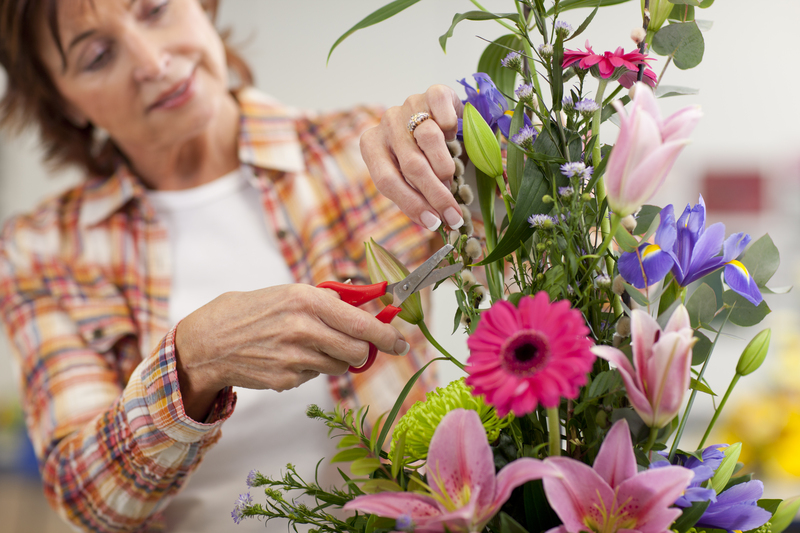The Relationship Between Your Birth Flower and Your Identity
Posted on 30/08/2025
The Fascinating Connection Between Your Birth Flower and Identity
Flowers have always been a powerful symbol within human cultures -- they mark celebrations, express emotions, and even communicate meanings without words. While most people are familiar with zodiac signs and birthstones, many overlook another beautiful element tied to our birth month: birth flowers. But did you know that the blossom associated with your birth might reveal unique aspects of your character and influence your personal identity? In this article, we'll delve deep into the relationship between your birth flower and your identity, exploring the intriguing stories, symbolism, and personality traits hidden in these petals.

The Tradition of Birth Flowers: A Blossoming History
The idea of each month having a special flower dates back to ancient times, with roots in both Roman and Victorian traditions. In particular, the language of flowers, or floriography, flourished in the 19th century, where blooms were used to communicate secret messages. Much like astrological signs and birthstones, the tradition of assigning a birth flower to each month helps individuals feel connected to nature and their own unique identity.
- January: Carnation and Snowdrop
- February: Violet and Primrose
- March: Daffodil and Jonquil
- April: Daisy and Sweet Pea
- May: Lily of the Valley and Hawthorn
- June: Rose and Honeysuckle
- July: Larkspur and Water Lily
- August: Gladiolus and Poppy
- September: Aster and Morning Glory
- October: Marigold and Cosmos
- November: Chrysanthemum
- December: Narcissus and Holly
These flowers are more than just birthday bouquet suggestions -- they hold centuries of symbolism and meaning. Understanding your birth month flower illuminates insights into your personality and the subtle forces shaping your identity.
How Birth Flowers Influence Your Identity
Just as some people believe their zodiac or birthstone reveals hidden truths about who they are, others feel a kindred connection with their birth flower. But how can a simple flower shape your character? The answer lies in symbolism, collective consciousness, and personal association.
Symbolic Meanings Embedded in Birth Flowers
Each flower carries specific cultural and symbolic meanings, attributed over centuries. When you learn about your birth flower meaning, you often find traits and qualities echoed in yourself. For instance:
- Carnation (January): Symbolizes admiration, affection, and resilience.
- Daffodil (March): Represents new beginnings, optimism, and creativity.
- Rose (June): Embodies love, beauty, and passion.
People often internalize these meanings, subconsciously aligning their self-image and aspirations with the virtues and stories their birth flower represents.
The Power of Collective Consciousness
Society has long intertwined identity with symbolism -- a practice found in everything from astrology to the color symbolism in fashion. When you're told your birth flower is a resilient carnation, joyful daffodil, or regal chrysanthemum, you're more likely to see those qualities within yourself. This phenomenon is known as the self-fulfilling prophecy.
Moreover, you may feel a sense of pride, uniqueness, or even responsibility to uphold your birth flower's attributes, subtly influencing your choices and self-perception.
Personal Associations and Emotional Connections
Flowers evoke profound memories. Perhaps you've always received lilies on your birthday, or the fragrance of violets reminds you of home. These deeply personal associations blend with traditional flower symbolism to shape your thinking, feelings, and even your values.
Birth Flowers and Personality Traits: Month-by-Month Exploration
Let's explore what each birth month flower says about those born under its bloom. Find your birth month and see how these age-old symbols may reflect your identity.
January: Carnation and Snowdrop
- Carnation: Associated with steadfastness, admiration, and strong will. January-born individuals are often perceived as determined and loyal, valuing deep relationships and inner strength.
- Snowdrop: Symbolizes hope and rebirth; those who resonate with the snowdrop often have a gentle, quiet resilience, able to recover gracefully from adversity.
February: Violet and Primrose
- Violet: Linked to humility, faithfulness, and spiritual insight. February birthdays tend to be empathetic, wise, and nurturing.
- Primrose: Stands for young love and devotion. Those connected with primrose are often hopeful and loyal romantics at heart.
March: Daffodil and Jonquil
- Daffodil: Represents renewal, optimism, and imagination. March individuals are said to possess creative minds and infectious positivity.
- Jonquil: Conveys desire and affection. People linked with jonquils embrace life's joys and seek close emotional bonds.
April: Daisy and Sweet Pea
- Daisy: Symbolizing innocence and purity, April-borns are youthful in spirit, straightforward, and joyful.
- Sweet Pea: Associated with pleasure and gratitude. Those with this flower are gracious and value happy memories and close friendships.
May: Lily of the Valley and Hawthorn
- Lily of the Valley: Denotes sweetness, humility, and renewal. May births are often gentle souls with wise, grounding qualities.
- Hawthorn: Represents hope, happiness, and protection. Hawthorn-linked individuals uplift others and exude optimism.
June: Rose and Honeysuckle
- Rose: The ultimate symbol of love and beauty. June-borns exhibit passionate, loving, and creative natures.
- Honeysuckle: Stands for happiness and eternal bonds. They cherish strong connections and have a zest for life.
July: Larkspur and Water Lily
- Larkspur: Conveys positivity, dignity, and grace. July individuals are warm-hearted, supportive, and graceful under pressure.
- Water Lily: Signifies purity and enlightenment, suggesting a deep, serene spirit with a reflective mind.
August: Gladiolus and Poppy
- Gladiolus: Symbolizes strength and integrity. August people are brave, loyal, and natural leaders.
- Poppy: Represents imagination and solace. If you resonate with poppies, you may have a dreamy, introspective personality.
September: Aster and Morning Glory
- Aster: Denotes wisdom, patience, and elegance. September-borns are detail-oriented, calm, and quietly influential.
- Morning Glory: Emblematic of affection and renewal, these individuals find joy in small moments and meaningful exchanges.
October: Marigold and Cosmos
- Marigold: Associated with creativity, passion, and warmth. October individuals have radiant personalities, often inspiring others.
- Cosmos: Signifies order and harmony. Those connected with cosmos tend to be balanced and approach life calmly.
November: Chrysanthemum
- Chrysanthemum: Embodies joy, longevity, and friendship. November-borns are devoted, reliable, and possess vibrant, optimistic spirits.
December: Narcissus and Holly
- Narcissus: Symbolizes hope and inspiration. December people often have visionary outlooks and encourage others to dream big.
- Holly: Stands for protection and goodwill. Those with holly connections are steadfast friends, bringing warmth and comfort wherever they go.
Birth Flowers vs. Birthstones and Zodiac: Unique Identity Insights
A frequent question arises: How do birth flowers compare to zodiac signs or birthstones? All three offer symbolic insights, but birth flowers are special because they ground your sense of self in natural beauty and evolving growth. Unlike static stones or distant constellations, flowers are living, breathing symbols -- they bloom, inspire, and connect with our every sense.
- Birthstones are typically valued for their rarity and unchanging beauty, but can feel more material or detached from daily experience.
- Zodiac signs reflect cosmic influences, offering intricate personality profiles based on the stars.
- Birth month flowers root your identity in the present, reminding you of growth, renewal, and the patterns of nature.
By embracing your birth flower, you tap into a living symbol that echoes your personal journey and ever-unfolding self.
Ways to Embrace Your Birth Flower for Personal Growth and Well-being
The relationship between your birth flower and identity isn't limited to symbolism. You can actively incorporate your birth month flower into your everyday life to enhance well-being, self-discovery, and expression:
1. Mindful Reflection
Spend time reflecting on the symbolic qualities of your birth flower. Meditate or journal about how these characteristics do or don't resonate with you. This can foster greater self-understanding and mindfulness.
2. Home and Work Decor
Display fresh or dried versions of your birth flower at home or work. The scent and color can boost mood, spark creativity, and act as a gentle daily reminder of your unique attributes.
3. Celebrate Special Occasions
Use your birth month flower in celebrations -- from birthday parties to personal milestones. Incorporate it into bouquets, cakes, or even personal accessories for a meaningful touch.
4. Gift and Connection
Give friends and loved ones their birth flowers. It's a thoughtful gesture that can open conversations about personal identity and growth.
5. Personal Rituals
Consider creating small rituals -- such as lighting a candle scented like your flower or taking a nature walk among blooms -- to recharge and reflect on your journey.
Modern Birth Flowers: Trend or Timeless Tradition?
In an era fascinated by personalization and self-discovery, birth flower symbolism is experiencing a Renaissance. From jewelry and tattoos to custom art, more people are turning to their birth flower as a marker of identity and source of inspiration. The birth flower's ability to reflect evolving personalities makes it an enduring symbol, regardless of trends.

Frequently Asked Questions About Birth Flowers and Identity
What if I don't resonate with my birth flower's meaning?
Identity is complex and multifaceted. If the qualities associated with your birth flower don't ring true, explore your own relationship with its shape, color, or scent. Sometimes, personal meaning develops over time as you encounter the flower in different ways throughout life.
Can I have more than one birth flower?
Yes! Often, two flowers are linked to each month, and in some cultures, astrological birth flowers offer even more possibilities. You can choose what resonates most, or even adopt additional flowers for different facets of your personality.
Are there astrological connections with birth flowers?
Absolutely. Many traditions pair zodiac signs with specific flowers, creating another layer of symbolism. For example, Aries connects with thistle or honeysuckle; Cancer aligns with the water lily or lotus. Combining birth month and zodiac flowers brings even more depth to your personal narrative.
How can I discover more about my birth flower's symbolism?
Many books, websites, and florists offer in-depth guides to specific birth flower meanings. You might also explore the history of "the language of flowers" to discover traditional and cultural messages associated with your special bloom.
Conclusion: Nurture Your Unique Identity Through Your Birth Flower
The relationship between your birth flower and your identity is a fascinating blend of tradition, symbolism, and personal growth. Whether you cherish the strength of the carnation, the creativity of the daffodil, or the elegance of the chrysanthemum, your birth flower is an ever-blooming reminder of your unique spirit and journey.
Embrace the wisdom of your birth month flower to deepen self-awareness, celebrate individuality, and nurture your own garden of identity. Let the petals of your special bloom inspire you to grow, flourish, and share your beauty with the world.
Now that you know more about the relationship between your birth flower and your identity, why not explore this connection? Discover your birth flower's history, symbolism, and meanings, and let it guide you every day towards greater authenticity and joy.
Latest Posts
Expert Advice for Making Poinsettias Enduring
Flower Longevity: Top 3 Easy Preservation Tips
The Relationship Between Your Birth Flower and Your Identity







